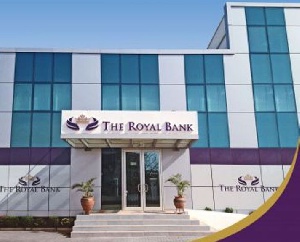The Royal Bank (TRB) has revealed it is well positioned to meet the Bank of Ghana’s planned new minimum capital requirement.
The bank has indicated plans to explore options such as shareholder and/or new investor financing for the recapitalization bid.
According to management, the bank’s financial position has improved significantly with a positive outlook especially after exceeding the 2017 half year target.
The bank in the period under review demonstrated resilience in a challenging macroeconomic environment which impacted negatively on the SME sector, its core client base.
The issues came to light during an engagement between management and Business Editors.
TRB estimated to make a loss of GHS 38 million by half year due to its rising bad loans. It, however, posted a profit of GHS2.6 million after recovering part of the bad loans and increasing its demand deposits by 52%.
This compares with a loss of GHS38 million at the end of the 2016 – largely due to impairment charges of GHS 68 million recorded that year.
The bank also successfully grew its interest income by 18% year on year – largely attributed to an increase in loan and advances.
Growth in non-funded income also remained strong, rising by 20% year on year on the back of increased trade transactions and expansion of the forex product offering.
TRB’s exposures to hard-hit sectors of the economy such as agriculture however adversely affected its asset quality and resulted in a rise in Non-Performing Loans (NPL’s).
The Managing Director, Osei Asafo-Adjei who expressed pleasant surprise at the sharp turn of events this year added the bank will be in a much better position if some contractors who have executed government contracts were paid.
The management he disclosed has adopted a three-pronged approach to turn around the fortunes of the bank; focusing on recoveries, improving on asset quality and increasing operational efficiency and human capital.
“We have set up a special department to recover our Non-Performing Loan portfolio, while we review and improve our credit policies to ensure our loan assets are of the best quality. Our strategy to improve efficiency is built on improving revenue through income diversification and reducing our cost of funds.
“In this regard, we will continue to grow our non-funded income by cementing the gains achieved in expanding our trade finance portfolio and increasing income from transactional banking obtained through use of our e-banking platforms and other innovations,” he said.
Business News of Sunday, 13 August 2017
Source: todaygh.com

















